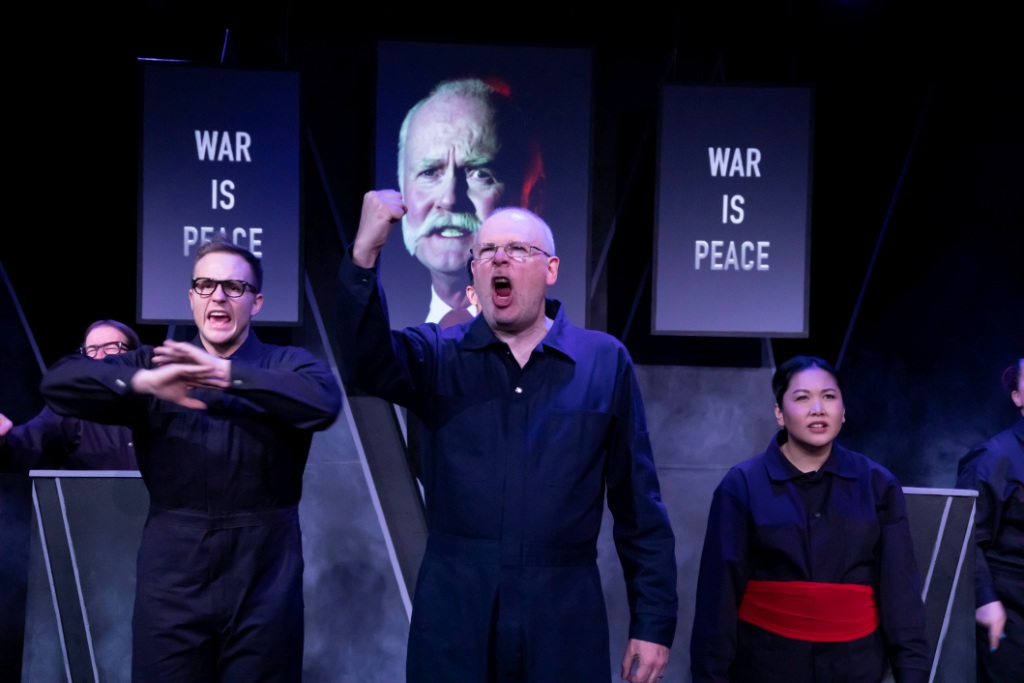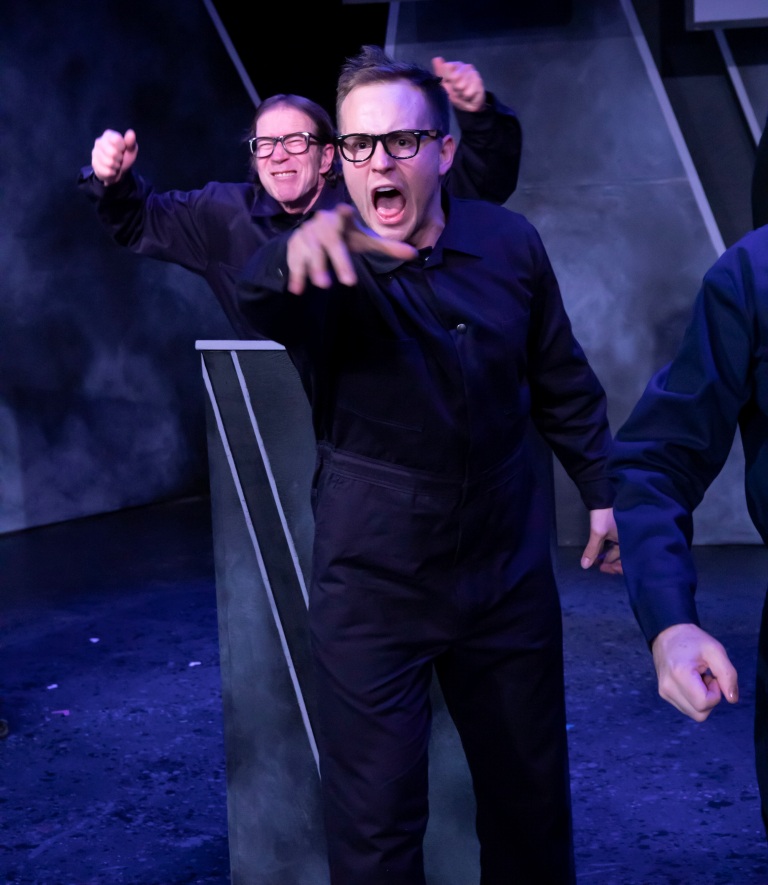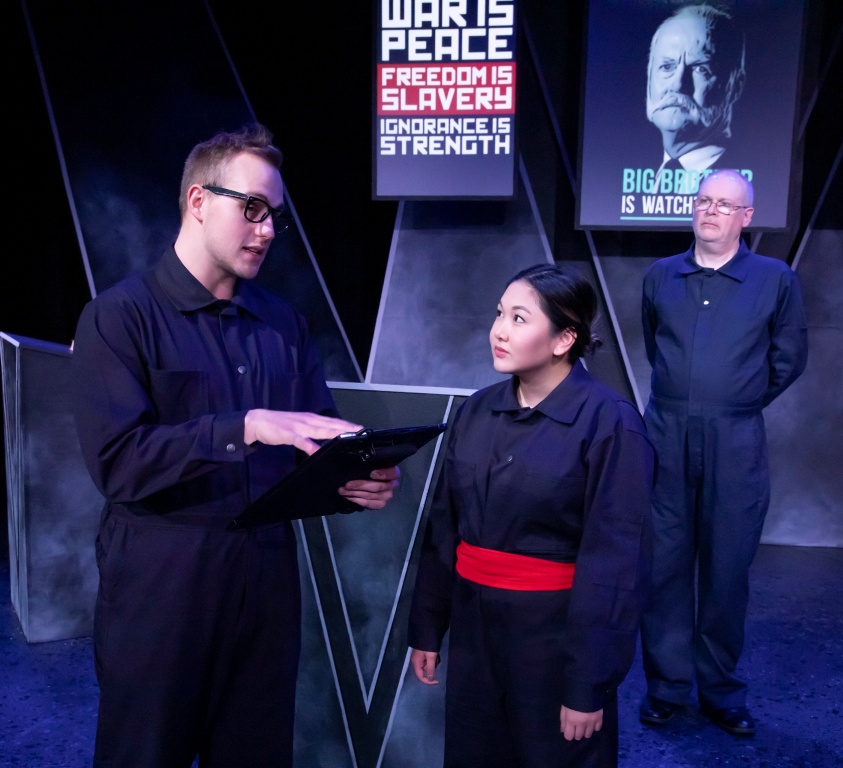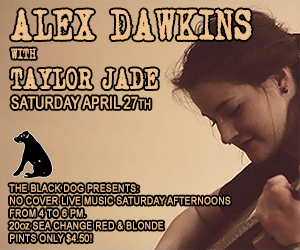REVIEW: Walterdale’s 1984 Doubleplus Good!
Posted on February 6, 2020 By Colin MacLean Entertainment, Front Slider, Theatre
 In the last two weeks Edmonton theatre has presented two remarkably prescient stories of how easily corruption, dehumanization and fear can overtake a society. Both were written in the past, and chart many misuses of power that are so sadly obvious today.
In the last two weeks Edmonton theatre has presented two remarkably prescient stories of how easily corruption, dehumanization and fear can overtake a society. Both were written in the past, and chart many misuses of power that are so sadly obvious today.
MacEwan’s drama department is currently running an excellent version of Arthur Miller’s 1954 disquieting tale of the witches of Salem, The Crucible – and now Walterdale Theatre is mounting a stage version of George Orwell’s 1984 through Feb 15.
One is struck at how close Orwell’s biting satire of the Soviet communism of the 1940s came to describing the rise of authoritarian governments all over the world today. 1984 presents a society devoid of basic human rights or privacy, governed by an efficient but soulless bureaucracy, supported by emotions of hatred and patriotism in a docile population. The people are controlled by “Thought Police,” and led by a deified leader named “Big Brother.”
 “Double Think” is promoted – that is the ability to believe two contradictory ideas at the same. You will believe that “two and two make five.”
“Double Think” is promoted – that is the ability to believe two contradictory ideas at the same. You will believe that “two and two make five.”
“Newspeak,” is the blind belief in what is now called fake news. (All words in quotations were created by Orwell for his book.) Trump’s “alternative facts” are there, too, under a different name.
Time has shown that Orwell’s timeline was off a bit. Some of his more drastic predictions have not come to pass, but enough of them have to maintain his book’s currency – even he could not forecast the digital universe, Facebook, Google, Twitter and our troll-filled, electronically-tethered interconnectedness.
The story: A character named Winston (Mike Anderson) falls in love with his charming and lively co-worker Julia (Murriel Mapa). The two find enough strength in each other to pull away from their stultifying life, searching desperately for scraps of love and freedom. Ignoring the dictates of the government, they secretly marry, share (banned) real coffee while she wears a party dress. But the implacable society is not to be assailed and malevolent forces separate them, leading to the inevitable climax.
This production rests on the shoulders of Anderson – who is in just about every scene. At first, as the downtrodden main character, he fails to register strongly, but slowly generates a degree of hope for Winston. You begin to cheer him through his giddy and affectionate romance. The actor comes into his own in the considerably more riveting Act II, and most effectively responds to horrible tortures carrying through to the great sadness at the end. There are no happy endings here.
 Mapa is a delight from beginning to end, often sustaining the production through her sheer exuberance. It’s nice to see the reliable Andrew Mecready back on a Walterdale stage. His O’Brien is the genial but sinister rogue representative of the government whose job is to re-educate Winston after his transgressions – in the dreaded Room 101.
Mapa is a delight from beginning to end, often sustaining the production through her sheer exuberance. It’s nice to see the reliable Andrew Mecready back on a Walterdale stage. His O’Brien is the genial but sinister rogue representative of the government whose job is to re-educate Winston after his transgressions – in the dreaded Room 101.
Another performance of note is Syrell Wilson, a garrulous landlady who remembers the good times before the revolution.
There have been large numbers of recent productions of Orwell’s prescient book using security cameras and multiple screens – but that is certainly beyond the budget of an amateur theatre. Director Monica Roberts effectively uses what is available to her to set (with a bit of imagination on the audience’s part) the parameters of a believable dystopian future. Her set (by Bailey Ferchoff) is a take on Star Trek with battleship grey angular flats and a huge luminous red “V” in the middle. At the back are three screens which carry propaganda, and a portrait of the properly forbidding image of Big Brother (Martin Stout). Madeline Setzer stares directly at us from the screens doing her best Kellyanne Conway to announce an afternoon execution, or another war victory.
The director manages to set a real tone of dread throughout. Darrell Portz provides seamless and effective sound and video effects.
The play adaptation by Robert Owens, Wilton E. Hall and William A. Miles, Jr., despite Orwell’s dense and ominous commentary, is in this worthy Walterdale production dramatically involving and easy to understand, effectively showing us that power has as its true end nothing but the perpetuation of itself.
And that, as the cartoon character Pogo used to say, “We have located the enemy – and it is us.”
Photos by Scott Henderson













